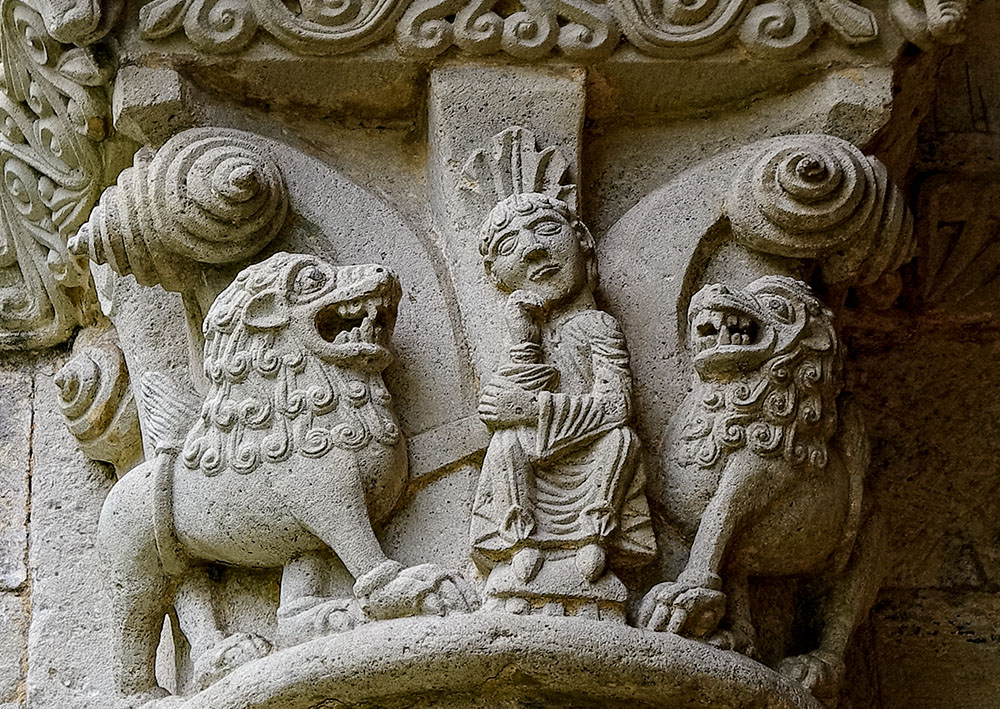
Daniel in the lion's den, depicted in stone at Sauve Majeure Abbey in La Sauve, Gironde, France (JLPC/Wikimedia Commons/CC BY-SA 3.0)
When I was about 3 or 4 years old, there came a terrific storm of thunder and lightning that made the windows and doors shake. I was terrified. To comfort me, my mother put me on her lap with her arms around me so we could watch the storm together.
Lightning would strike and she would exclaim, "Ooh aah!" just as if we were watching fireworks. Then she would hug me very tight and say, "Listen! It's going to come now!" And the thunder would bellow and roll.
She not only cured me of my fear, but, for the rest of my life, thunder and lightning would stir up feelings of joy, excitement, love and safety.
Daniel, the very one whom God protected while he spent the night in the lair of some hungry lions (Daniel 6), predicted the coming of "a time unsurpassed in distress since the nations began." After slumbering with the beasts, what more could ever worry him?
When we read the whole passage, we see that Daniel's message was not about horror and destruction, but consolation: "Your people shall escape ... many of those who [have died] shall awake ... the wise shall shine brightly ... [the just] shall be like the stars forever."
Daniel's encounter with the lions was actually a foretaste of universal history. In spite of those who preach gloom and damnation, apocalyptic literature agrees with Julian of Norwich, "All shall be well, and all manner of things shall be well."
In today's Gospel, we hear Jesus preach just before entering into the events of his passion. He had already warned his followers that he was going to be captured and killed. When that finally happened, the sun did go dark and even Jesus cried out to God by whom he felt abandoned. With his resurrection, God proclaimed the definitive apocalyptic message: God's love and faithfulness are invincible, no matter what.
We cannot deny that, in this Gospel, Jesus seems to be promising a quick end to the world. "This generation will not pass away." Was he just simply wrong? Or might it be that the "things" he mentioned had begun to take place with his life and death, and especially his resurrection?
The Letter to the Hebrews says that after Christ, there is no more need for sacrifice. What does that have to do with what Jesus proclaimed?
Hebrews' author states that, "By one offering, he has made perfect forever those who are being consecrated." Jesus proclaimed that God's future was and is now in process. It is happening among those who "are being consecrated." They are part of the world God is constantly drawing toward union with one another and the triune God.
Today's responsorial psalm sings the same message of God's nearness, "You are my inheritance, O Lord ... my heart is glad, and my soul rejoices ... because you will not abandon me."
Advertisement
Jesus says, "Learn a lesson from the fig tree." Pope Francis improvised on that in a meditation titled "Times Change." His opening line is: "Times change and we Christians must constantly change." He went on to call Christians to learn to understand the signs of our times, that is to pay close attention to what is happening in our world and to seek God's saving presence in it.
To do that, he said, "Silence is necessary ... [we need] to observe ... and afterwards to think," by which he meant to question. He suggested that we wonder, "Why are there so many wars now?"
He added, "Times change and we Christians must continually change. We must change, steadfast in the faith in Jesus Christ ... our approach must constantly move according to the signs of the times."
Today's readings could hardly be more appropriate for us as we live through this change of era. Theologian Franciscan Sr. Ilia Delio describes our time saying, "The feeling of a destabilized world is creating global depression and anxiety."
In this world in which the media keeps death and disaster constantly in front of us, we Christians have an apocalyptic vocation. Faith leaves us no room to moan or spread fear about what is happening, but to cultivate attitudes and behavior that proclaim, "God does not abandon us."
In order to do that in a credible way, we need to listen deeply to Jesus' promise that when things seem to be falling apart and the very forces of nature seem to wreak death, God is near, the reign of God is truly among us.
Christ invites us to read our frightening moment of history as a promise that God is here, ready to transform fear into joy.
